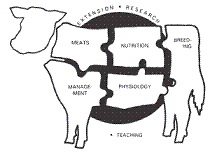Animal Science, Department of

Nebraska Beef Cattle Reports
Date of this Version
January 1996
Abstract
Research conducted at the University of Nebraska has evaluated wet and dry distillers byproducts as energy sources for cattle. The majority of the research has been conducted with distillers byproducts resulting from the fermentation of corn. However, in the dry milling industry various cereal grains may be used to produce ethanol and distillers byproducts. The resulting byproducts have the potential to have a different feeding value when compared to byproducts produced from corn. A Nebraska trial (1995 Nebraska Beef Report, pp. 25-26) conducted by Lodge et al. indicated steers consuming diets containing distillers byproducts (40% of diet DM) produced from the fermentation of primarily sorghum gained less and were less efficient than previous research with coin byproducts would have predicted. These data imply that distillers byproducts produced from grain sorghum may have a lower feeding value than corn based distillers byproducts. One explanation for this difference in performance may be related to differences in digestibility between corn and sorghum distillers byproducts. Therefore, a lamb digestibility trial was conducted to evaluate the digestibility of wet and dried distillers byproducts produced from the fermentation of corn or sorghum.


Comments
Published in 1996 Nebraska Beef Cattle Report; published by Agricultural Research Division, Institute of Agriculture and Natural Resources, University of Nebraska-Lincoln.